Global flight tracking for civil aviation - a new resolution instructing WRC-15 to include this topic on its agenda
The loss of Malaysia's Flight MH370 has spurred worldwide discussions on global flight tracking and the need for ITU and other relevant organizations to coordinate action within the scope of their respective mandates. On 30 October, the Plenipotentiary Conference, which has been addressing this matter through its Committee 5, approved a new resolution titled "Global flight tracking for civil aviation".
Determining the position of aircraft and reporting it to air traffic control centres is an important element of aviation safety. The International Civil Aviation Organization (ICAO) has developed standards and recommended practices for systems that do this.
ICAO, at its special meeting on global flight tracking (Montreal, 12-13 May 2014), encouraged ITU to provide the necessary spectrum allocations for satellite to meet emerging aviation needs. The agenda of the forthcoming World Radiocommunication Conference in 2015 (WRC-15) does not directly address global flight tracking, but studies on global flight tracking are ongoing in the ITU Radiocommunication Sector (ITU-R).
The new resolution instructs WRC-15 to include on its agenda the consideration of global flight tracking, taking into account ITU-R studies. The Secretary-General will bring this resolution to the attention of WRC-15 and ICAO. The Director of the ITU Radiocommunication Bureau will prepare a specific report on the matter for WRC-15.
"I would like to congratulate the plenary for this decision to place this very important item on the agenda of WRC-15. We are now in a position to move in a direction which will truly be in harmony with what has been requested by the international community, without constraining or prejudicing studies and decisions of WRC-15," said Conference Chairman Wonki Min.
The conference also considered and approved the following resolutions (new and revised), along with one decision, submitted in a series of texts from the Editorial Committee (Committee 4):
-
Resolution WG-PL/1 (Busan, 2014): Implementation of the Smart Africa Manifesto.
-
Resolution COM6/2 (Busan, 2014): ITU participation in memoranda of understanding with financial and/or strategic implications.
-
Resolution COM6/3 (Busan, 2014): Approval of the accounts of the Union for the years 2010 to 2013.
-
Resolution 34 (Rev. Busan, 2014): Assistance and support to countries in special need for rebuilding their telecommunication sector.
-
Resolution 41 (Rev. Busan, 2014): Arrears and special arrears accounts.
-
Resolution 71 (Rev. Busan, 2014): Strategic Plan for the Union for 2016-2019. Note that Annex 3 to this resolution "Allocation of resources to objectives and strategic goals" will be updated, once the Financial Plan for the Union for 2016-2019 is approved. Also, the use of the word "special" in the expression "persons with special needs" will be replaced by "specific" throughout this and other resolutions.
-
Resolution 72 (Rev. Busan, 2014): Linking strategic, financial and operational planning in ITU.
-
Resolution 151 (Rev. Busan, 2014: Implementation of results-based management in ITU.
-
Resolution 159 (Rev. Busan, 2014): Assistance and support to Lebanon for rebuilding its telecommunication networks (fixed and mobile).
-
Resolution 11 (Rev. Busan, 2014): ITU Telecom events.
-
Resolution 30 (Rev. Busan, 2014): Special measures for the least developed countries, small island developing States, landlocked developing countries and countries with economies in transition.
-
Resolution 135 (Rev. Busan, 2014): ITU's role in the development of telecommunications/information and communication technologies, in providing technical assistance and advice to developing countries and in implementing relevant national, regional and interregional projects.
-
Resolution 136 (Rev. Busan, 2014): The use of telecommunications/information and communication technologies for monitoring and management in emergency and disaster situations for early warning, prevention, mitigation and relief.
-
Resolution 157 (Rev. Busan, 2014): Strengthening of the project execution function in ITU.
-
Resolution 183 (Rev. Busan, 2014): Telecommunication/ICT applications for e-health.
-
Decision 12 (Rev. Busan, 2014): Free online access to ITU publications.
Conference swears in newly-elected officials
The conference (also on 30 October) set 1 January 2015 as the date on which the newly-elected officials and the 12 members of the Radio Regulations Board will take office.
A swearing-in ceremony saw Secretary-General Elect, Houlin Zhao, and Deputy Secretary-General Elect, Malcolm Johnson take the oath of office. The re-elected officials received their letters of re-appointment from the Chairman of the Conference, Wonki Min: François Rancy, re-elected Director of the Radiocommunication Bureau; and Brahima Sanou, re-elected Director of the Telecommunication Development Bureau.
Director Elect of the Telecommunication Standardization Bureau, Chaesub Lee, also took the following oath of office, as did Mr Zhao and Mr Johnson:
"I solemnly swear to exercise in all loyalty, discretion and conscience the functions entrusted to me as a staff member of the International Telecommunication Union; to discharge these functions and to regulate my conduct with the interest of the Union only in view, without seeking or accepting instructions or assistance from any Government or other authority external to the Union in regard to the accomplishment of my duties."
Administration and Management
At its seventh meeting on 29 October, Committee 6 (Administration and Management) endorsed revisions to existing resolutions, specifically Resolution 144 – Availability of model Host Country agreements in advance for conferences and assemblies of the Union held away from Geneva, Resolution 94 – Auditing the accounts of the Union, and Resolution 154 – Use of the six official languages of the Union on an equal footing.
The draft Financial Plan for the Union for 2016-2019 and its associated draft Decision 5 were then presented, followed by interventions from a number of participants. Discussions focused on the revisions needed to the draft financial plan and on balancing the budget, following the decrease in the contributory units announced by some Member States two days earlier. Consequently, an ad hoc group was set up to finalize these documents and propose a revised financial plan and Decision 5 to a later meeting of Committee 6.
At its eighth meeting, Committee 6 endorsed Resolution 58 – Strengthening of relations between ITU and regional telecommunication organizations and regional preparations for the Plenipotentiary Conference, and Resolution 25 –Strengthening the regional presence. The Committee took note of the report on the Decisions of the World Telecommunication Development Conference, held earlier this year in Dubai. In addition, following a note from Committee 5, Committee 6 endorsed the decision that contributions related to proposed changes to the Union's Constitution and Convention would be submitted to, and discussed in, the next meeting of the Council Working Group on Financial and Human Resources and subsequently to the Council. Similarly, the contribution to amend the procedure for fixing the magnitude of penalties applied to members in respect of overdue contributions and other dues payable to the ITU budget would follow this path.
The draft financial plan and potential future saving opportunities were again discussed and the comments expressed will serve as input to the work of the ad hoc group on this topic. Committee 6 then moved on to discuss the advantages and disadvantages of utilizing revenue generated from international numbering resources for the purpose of balancing revenue and expenses. A number of participants intervened on this topic, resulting in requests for more discussions and in the organization of informal meetings. Input from these discussions will be taken on board by the ad hoc group on the financial plan and Decision 5. The group will report on progress in a later meeting of Committee 6.
At its ninth meeting, Committee 6 endorsed proposed revisions to Resolution 48 - Human resources management and development, Resolution 152 – Improvement of management and follow-up of the defrayal of ITU expenses by Sector Members and Associates, Resolution 158 – Financial Issues for consideration by the Council and Resolution 170 – Admission of Sector Members from developing countries to participate in the work of the ITU Radiocommunication Sector and the ITU Telecommunication Standardization Sector.
Among the ad hoc groups set up by Committee 6, one group had completed its task as the second week of the conference ended. Several others are in progress to deliver their input to their parent committee early in third and final week of the conference. Following are Committee 6 ad hoc groups.
Ad hoc group on ITU Telecom events
Following a contribution proposing significant changes in the organization and financing of ITU Telecom events, an ad hoc group was created to examine carefully the impacts of the proposed changes. ITU Secretary-General attended the final meeting of this ad hoc group in order to discuss the key points of the proposal and to explain the current successful financial model. Consequently, Committee 6 adopted a revised Resolution 11 that was approved by the plenary on 30 October. The updated resolution notes that the operational flexibility afforded to ITU Telecom management to meet all the challenges in its field of activity and compete in the commercial environment has proven to be useful. It also notes that ITU Telecom needs to adapt to new market conditions and calls for each ITU Telecom event to be financially viable and to have no negative impact on the ITU budget. The group was chaired by Nasser Saleh Al Marzouqi of the United Arab Emirates.
Ad hoc group on Resolutions 77, 111 and 153 on future conferences, assemblies and forums of the Union, scheduling of ITU conferences and assemblies, scheduling of Council sessions and plenipotentiary conferences
Committee 6 decided to set up an ad hoc group to discuss the proposals from the Arab Group, the United States and from Brazil to revise Resolution 77 – Future conferences, assemblies and forums of the Union (2011-2014), Resolution 111 – Scheduling of ITU conferences and assemblies, and Resolution 153 – Scheduling of Council sessions and plenipotentiary conferences.
Revisions to these resolutions will aim to optimize the scheduling of ITU events in order to allow participants to better prepare for these events, to increase the efficiency in the use of ITU resources and to ensure that every effort is made to avoid scheduling major events, including ITU Council sessions, during a major religious period for a Member State. The group is chaired by Vernita Harris of the United States and will be reporting back to Committee 6 at the beginning of the third and final week of the conference.
Ad hoc group on the Union's headquarter premises over the long term
The ITU secretariat presented Document PP14/57 on the Union's headquarter premises over the long term. Participants raised many questions regarding the content of this detailed document. Comments from participants stressed the significance of any decision on this topic. In the light of these interventions, Committee 6 set up an ad hoc group. The group is chaired by Xavier Bellmont of Spain, and its mandate is to develop a mechanism for deciding the way forward on this matter.
Ad hoc group on the draft Financial Plan for the Union for 2016-2019 and draft Decision 5
Committee 6 decided to set up an ad hoc group to address the revision of the draft financial plan following the decrease in the number of contributory units announced at the beginning of the second week of the conference. Many participants in this ad hoc group discussed the best option to balance the Financial Plan for the Union for the period 2016-2019. The options considered include using the ITU Reserve Account, deciding on a mechanism to fund the After Service Health Insurance fund, identifying additional savings to the already recorded savings in the past biennia and discussing potential sources of revenue, including revenue from international numbering resources. The group is chaired by Mary Rios of the United States and should report back to its parent Committee at the beginning of third and final week of the conference.
Working Group of the Plenary – Overview of resolutions adopted
The sixth and fifth meetings of the Working Group of the Plenary (WGPL) took place on Wednesday, 29 October and Thursday, 30 October 2014. These meetings considered and adopted the following revised and new resolutions:
-
Revision of Resolution 2, "World telecommunication/information and communication technology policy forum" was based on proposal ARB/79A1/2 from the Arab States Group and was approved with a few editorial changes from the floor.
-
Revision of Resolution 70, "Gender mainstreaming in ITU and promotion of gender equality and the empowerment of women through information and communication technologies". A consolidated text of this resolution (Document DT/13), prepared under the leadership of the Dominican Republic was considered and approved. The revision of Resolution 70 reinforces ITU´s commitment to mainstreaming gender equality across the Union. New elements in this resolution include a request to modify recruitment policies in ITU in order to increase the number of women in senior positions in the organization, and a call to action to reinforce ITU´s main initiatives on promoting gender equality through ICT, such as the celebration of "Girls in ICT Day", or the continuation of the "GEM-TECH Awards".
-
Revision of Resolution 123, "Bridging the standardization gap between developing and developed countries", was approved following consolidation of proposals IAP/34R1-A1/14, ACP/67A1/10 and RCC/73A1/15 under the leadership of South Africa. The revised resolution (Document DT/41) puts further emphasis on the need to enhance capacity-building activities, as well as to promote the development of guidelines for developing countries related to priority standardization issues.
-
Revision of Resolution 137, "Next-generation network deployment in developing countries", was approved following consolidation of proposals ACP/67A1/13 and RCC/73A1/17, under the leadership of Belarus. The revised resolution (Document DT/37) puts further emphasis on the need to share best practices on business model evolution and operational aspects of next- generation networks.
-
Revision of Resolution 174, "ITU's role with regard to international public policy issues relating to the risk of illicit use of information and communication technologies" was approved following consolidation of proposals CUB/70/3, B/75/6 and ARB/79A4/4. The final revised resolution (Document DT/43) was presented by Algeria, the originator of this resolution in Guadalajara in 2010.
-
New resolution on "Protecting Telecommunication Service Users/Consumers". Mexico presented the consolidated proposal for this new resolution (Document DT/28), which will encourage the creation and promotion of policies that ensure the delivery of free, transparent, updated and accurate information to end users about telecommunication services, including international roaming rates and relevant applicable conditions, in a timely manner.
-
New resolution on "Facilitating Internet of Things (IoT) to prepare for a Globally Connected World". The Republic of Korea put forward a proposal for this new resolution, which now reflects the work conducted by the ad hoc group on IoT (Document DT/31). This resolution seeks to promote investment in, and development of, IoT through exchange of experiences, reinforcement of work conducted in relevant ITU-T study groups and organization of seminars and capacity-building activities across the world.
-
New resolution on "Empowerment of youth through telecommunication/information and communication technology". Poland, supported by Costa Rica, had presented a proposal for a new resolution. The resolution aims to promote ICT skills development for youth and careers in the ICT sector, ensure monitoring of youth's uptake and use of ICT including on aspects which might be harmful and dangerous, ensure ITU benefits from the input of young professionals and encourages Member State administrations to include young professionals in the composition of their delegations (Document DT/26).
-
New resolution "To promote efforts for capacity building on software-defined networking (SDN) in developing countries". Belarus presented the consolidated text for this new resolution, which will promote the organization of workshops and disseminate best practice on SDN. In this way, the gap in technology adoption in developing countries may be bridged at early stages of implementation of SDN-based networks.
The eighth and ninth meetings of the Working Group of the Plenary (WGPL) took place on Friday, 31 October 2014 (morning and afternoon) and endorsed the following revised and resolutions:
-
Revision of Resolution 139, "Telecommunications/information and communication technologies to bridge the digital divide and build an inclusive information society". The result of the consolidation work, led by Egypt, was presented and endorsed (Document DT/38). The revision of this resolution puts further emphasis on the need to promote the implementation of policies to promote public and private investments to bridge the digital divide, using available technologies, such as radiocommunication systems. The revised resolution also highlights the importance of strengthening cooperation with the relevant international and regional organizations to bridge the digital divide.
-
Revision of Resolution 176, "Human exposure to and measurement of electromagnetic fields". Revised Resolution 176 (Document DT/46) is the result of the work of the ad hoc group on this resolution, chaired by Nguyen Ngoc Anh of Viet Nam. The revised resolution strengthens ITU's mandate to contribute to the work of relevant organizations to define international standards related to electromagnetic fields exposure. It invites ITU Member States to raise public awareness on this topic and to comply with the guidelines produced by ITU.
-
Revision of Resolution 131 (Rev. Guadalajara, 2010), with a revised title "Measuring Information and Communication Technologies to build an integrating and inclusive information society". Revised Resolution 131 (Document DT/42) is the result of the consolidation work led by Argentina. The revision of this resolution strengthens ITU´s mandate to compile information and statistical data on information and communication technologies for evaluating ICT trends and measuring impact in narrowing the digital divide, showing impact on matters related to gender, persons with disabilities, and the different social sectors. The revised resolution also aims at strengthening cooperation between ITU and other organizations involved in collecting ICT data.
-
New resolution on "Creating an enabling environment for the deployment and use of ICT applications". This resolution (Document DT/49) was endorsed, with a few editorial comments from the floor. The resolution is the result of the work of the ad hoc group on convergence, chaired by Youn Jung Park of the Republic of Korea. This new resolution instructs ITU to reflect the use of ICT applications in the ICDT Development Index, inviting Member States to promote the introduction of e-applications to support sustainable development, in the fields of public administration, business, education and training, health, employment, environment, agriculture, manufacturing industry and science, among others, within the framework of national e-strategies.
Work during the weekend
With this progress, the Working Group of the Plenary closed its 9th meeting, having endorsed a total of 18 resolutions (revised and new), representing 50 per cent of the work assigned to the group. At the time of this writing, the following ad hoc groups were holding weekend meetings:
-
Ad hoc group on Resolution 64 (non-discriminatory access), chaired by Yoon Jeong Park, Republic of Korea.
-
Ad hoc group on Resolution 130 (building security in the use of ICTs), chaired by Jeferson Nacif, Brazil.
-
Ad hoc group on Internet Resolutions (covering Resolutions 101, 102, 133, 180, as well as proposals for new resolutions on IXPs, multilingualism, and bridging the connectivity divide), chaired by Fabio Bigi, Italy.
-
Ad hoc group on WSIS, chaired by Professor Minkin, Russian Federation
-
Ad hoc group on Decision 11, chaired by Felicity Morrison, Australia.
Credentials Committee concludes its work
At its second and final meeting, Committee 2 (Credentials) verified all remaining original credentials, transfers of powers and proxies not examined during its first meeting and that were submitted up until 29 October. It also considered credentials received by e-mail and by fax, pending receipt of the corresponding original documents. Overall, the Committee considered 165 original credentials, 4 transfers of powers, 2 proxies, and 2 copies of credentials.
Committee 2 submitted its final report to the plenary on 30 October. In approving the report, the plenary agreed to authorize the Committee 2 Chairman, assisted by the ITU secretariat, to verify any credentials, transfers of powers and proxies received after 29 October and to submit the conclusions to plenary.
Meanwhile, a reminder in the Committee's report notes that only delegations whose credentials are found to be in order are entitled to sign the Final Acts of PP-14.
|
Quick Links
Photos and Videos
H.E. Mr. Ahmad Shabery Cheek, Malaysia
WTDC-14 policy statement on global flight tracking
PP-14 Interview: Cosmas L. Zavazava, BDT, ITU
PP-14 Interview: Ambassador Daniel A. Sepulveda, United States
PP-14 interview: Dr Win Mlambo, Deputy Minister, ICT, Postal and Courier Services, Zimbabwe
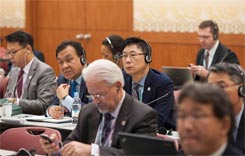
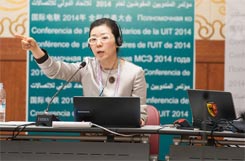
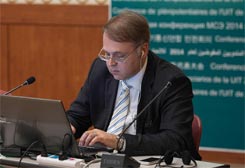
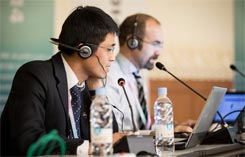
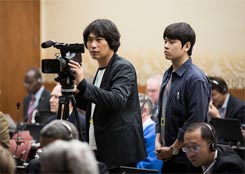
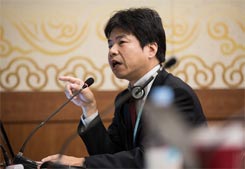
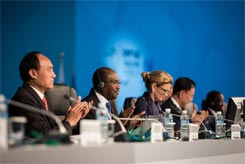
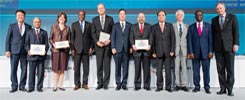
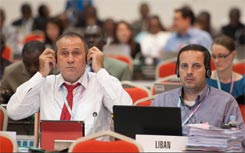
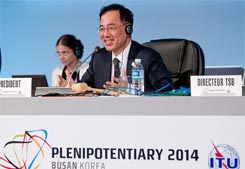
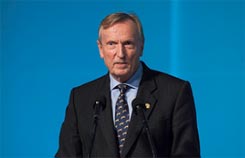
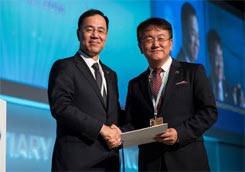
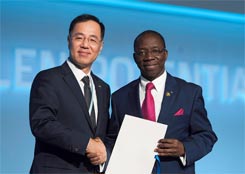
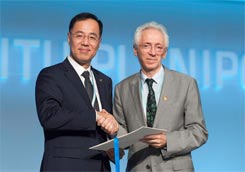
|
|
